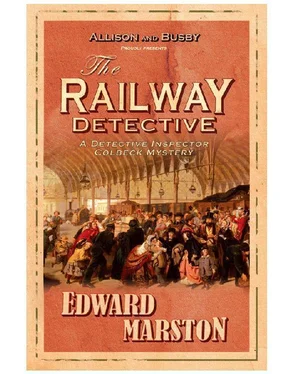Edward Marston - The Railway Detective
Здесь есть возможность читать онлайн «Edward Marston - The Railway Detective» весь текст электронной книги совершенно бесплатно (целиком полную версию без сокращений). В некоторых случаях можно слушать аудио, скачать через торрент в формате fb2 и присутствует краткое содержание. Жанр: Классический детектив, Исторический детектив, на английском языке. Описание произведения, (предисловие) а так же отзывы посетителей доступны на портале библиотеки ЛибКат.
- Название:The Railway Detective
- Автор:
- Жанр:
- Год:неизвестен
- ISBN:нет данных
- Рейтинг книги:4 / 5. Голосов: 1
-
Избранное:Добавить в избранное
- Отзывы:
-
Ваша оценка:
- 80
- 1
- 2
- 3
- 4
- 5
The Railway Detective: краткое содержание, описание и аннотация
Предлагаем к чтению аннотацию, описание, краткое содержание или предисловие (зависит от того, что написал сам автор книги «The Railway Detective»). Если вы не нашли необходимую информацию о книге — напишите в комментариях, мы постараемся отыскать её.
The Railway Detective — читать онлайн бесплатно полную книгу (весь текст) целиком
Ниже представлен текст книги, разбитый по страницам. Система сохранения места последней прочитанной страницы, позволяет с удобством читать онлайн бесплатно книгу «The Railway Detective», без необходимости каждый раз заново искать на чём Вы остановились. Поставьте закладку, и сможете в любой момент перейти на страницу, на которой закончили чтение.
Интервал:
Закладка:
‘What about that little vixen down in the cabin?’
‘She will be released as soon as we are safely in France.’
‘Released?’ said Sholto, mutinously. ‘After what she did to me?’
‘We have no more need of her, Thomas.’
‘You may not have — but I certainly do!’
‘No,’ decreed Gilzean. ‘Miss Andrews has borne enough suffering. As soon as we dock, I’ll pay for her return passage and give her money to make her way home from Bristol.’
‘But she will be able to tell them where we are.’
‘France is a much bigger country than England. Even if they sent someone after us — and that is highly unlikely — he would never find us.’
‘According to you, Inspector Colbeck would never find us.’
Gilzean was complacent. ‘We have seen the last of him now,’ he said. ‘Bid farewell to England. We are about to start a new life.’
The detectives crept up until they stood only yards behind the two men. Victor Leeming had a hand on his pistol but Robert Colbeck favoured a more physical approach. Since it was Thomas Sholto who had spirited Madeleine away, the Inspector tackled him first. Rushing forward, he grabbed Sholto by the legs and tipped him over the side of the ship. There was a despairing cry, followed by a loud splash. Gilzean spared no thought for his friend. He reacted quickly, pulling out a pistol. Before Gilzean could discharge it, Colbeck got a firm hold on his wrist and twisted it so that he turned the barrel of the weapon upwards.
Seeing the pistol, almost everyone else on deck backed away as the two men struggled for mastery. Sergeant Leeming pointed his own gun at Gilzean and ordered him to stop but the command went unheard. And since the combatants were now spinning around so violently, it was impossible for Leeming to get a clear shot at the man. He jumped back as Colbeck tripped his adversary up and fell to the deck on top of him. Gilzean fought with even more ferocity now, trying to wrest his hand free so that he could fire his weapon. Using all his strength, he slowly brought the barrel of the gun around so that it was almost trained on its target. Colbeck refused to be beaten, finding a reserve of energy that enabled him to force the pistol downwards and away from himself.
Gilzean’s finger tightened on the trigger and the gun went off. A yell of pain mingled with a gasp of horror that came from the watching crowd. Hearing the sound of the gunshot from below, Madeleine came running up on deck, fearing that Colbeck had been killed. Instead, she found him standing over Gilzean, who, compelled to shoot himself, was clutching a shoulder from which blood was now oozing.
‘Why did you not leave him to me ?’ complained Leeming.
‘I wanted the privilege myself.’
‘But I had a weapon.’
‘I am sorry, Victor,’ said Colbeck with a weary grin. ‘You can arrest Thomas Sholto, but you’ll have to haul him out of the water first.’ He turned to Madeleine. ‘They’ll not trouble you again, Miss Andrews,’ he promised. ‘Horses and ships have their place in the scheme of things but they were not enough to defeat the steam locomotive. That is what brought them down. Sir Humphrey was caught by the railways.’
Richard Mayne, the senior Police Commissioner, looked down at the newspapers spread out on his desk and savoured the headlines. The arrest of the two men behind the train robbery and its associated crimes was universally acclaimed as a triumph for the Detective Department at Scotland Yard. After sustaining so much press criticism, they had now been vindicated. That gave Mayne a sense of profound satisfaction. While he could bask in the general praise, however, he was the first to accept that the plaudits should go elsewhere.
He was glad, therefore, when Superintendent Tallis entered with Inspector Colbeck and Sergeant Leeming. The Commissioner came from behind his desk to shake hands with all three in turn, starting, significantly, with Robert Colbeck, a fact that did not go unnoticed by Tallis. The Superintendent shifted his feet.
‘Gentlemen,’ said Mayne, spreading his arms, ‘you have achieved a small miracle. Thanks to your efforts, we have secured some welcome approbation. The headlines in today’s newspapers send a message to every villain in the country.’
‘Except that most of them can’t read, sir,’ noted Tallis.
‘I was speaking figuratively, Superintendent.’
‘Ah — of course.’
‘No matter how clever they may be,’ continued Mayne, ‘we catch them in the end. In short, with a combination of tenacity, courage and detection skills, we can solve any crime.’
‘That is what we are here for, sir,’ said Tallis, importantly.
‘Our role is largely administrative, Superintendent. It is officers like Inspector Colbeck and Sergeant Leeming on whom we rely and they have been shining examples to their colleagues.’
‘Thank you, sir,’ said Leeming.
‘On your behalf, I have received warm congratulations from the Post Office, the Royal Mint, Spurling’s Bank, the Chubb factory, the commissioners for the Great Exhibition and, naturally, from the London and North Western Railway Company. The last named wishes to offer both of you free travel on their trains at any time of your choice.’
‘I will certainly avail myself of that opportunity,’ said Colbeck.
Leeming frowned. ‘And I most certainly will not,’ he said. ‘On the other hand,’ he added with a chuckle, ‘if the Royal Mint is issuing any invitations to us, I’ll be very happy to accept them.’
‘They merely send you their heartfelt gratitude,’ said Mayne.
Tallis sniffed. ‘Far be it from me to intrude a sour note into this welter of congratulation, sir,’ he said, ‘but I have to draw to your attention the fact that some of the evidence was not obtained in a way that I could bring myself to approve.’
‘Yes, I know, Superintendent. I’ve read your report.’
‘Then perhaps you should temper your fulsome compliments with a degree of reproach.’
‘This is hardly the moment to do so,’ said Mayne, irritably, ‘but, since you force my hand, I will. Frankly, I believe that you are the person who should be reprimanded. Had you let your men go to Sir Humphrey’s house on their own, they might well have made the arrests there. By making your presence known so boldly, Superintendent Tallis, you gave the game away. That was bad policing.’
‘We had the house surrounded, sir.’
‘Yet somehow they still managed to escape. In all conscience, you must take the blame for that.’
Trying not to grin, Leeming was enjoying the Superintendent’s patent unease, but Colbeck came swiftly to his superior’s aid.
‘It was a shared responsibility, sir,’ he told Mayne, ‘and we must all take some of the blame. Against anyone but Sir Humphrey Gilzean, the plan that Mr Tallis had devised might well have worked. And the Superintendent did, after all, prove that he is not chained to his desk.’
‘That merits approval,’ said Mayne, ‘it’s true. So let us be done with censure and take pleasure from our success. Or, more properly, from the success that you, Inspector Colbeck — along with Sergeant Leeming here — achieved in Bristol. Both of you are heroes.’
Leeming pulled a face. ‘That’s not what my wife called me when I stayed away for another night, sir,’ he confided. ‘She was very bitter.’
‘Spare us these insights into your sordid domestic life,’ said Tallis.
‘We made up in the end, of course.’
‘I should hope so, Sergeant,’ said Mayne with amusement. ‘Mrs Leeming deserves to know that she is married to a very brave man. You will have a written commendation to show her.’
‘Thank you, sir,’ said Leeming, happily, ‘but I only followed where Inspector Colbeck led me. He is the real hero here.’
Читать дальшеИнтервал:
Закладка:
Похожие книги на «The Railway Detective»
Представляем Вашему вниманию похожие книги на «The Railway Detective» списком для выбора. Мы отобрали схожую по названию и смыслу литературу в надежде предоставить читателям больше вариантов отыскать новые, интересные, ещё непрочитанные произведения.
Обсуждение, отзывы о книге «The Railway Detective» и просто собственные мнения читателей. Оставьте ваши комментарии, напишите, что Вы думаете о произведении, его смысле или главных героях. Укажите что конкретно понравилось, а что нет, и почему Вы так считаете.












